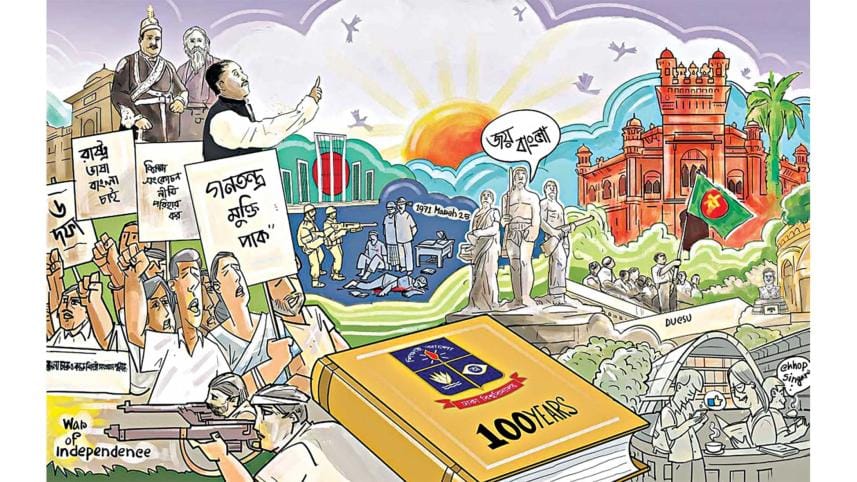Celebrating DU centenary in my own way

Winter always lingers delightfully on the Dhaka University campus. The fallen leaves of myriad colours underneath the tall trees create a surreal montage against the green grass. And the puff of air still carrying a little bit of chill has stories to tell—if you care to pause for a while and listen.
When I reached the Teacher-Student Centre (TSC) last Friday, it was already late in the afternoon. The setting sun painted the trees and buildings with a crimson tint of ethereal splendour. In fact, I came to the campus to feel the air, to smell the leaves, and to touch the grass to celebrate the centenary of Dhaka University in my own way.
As I stood in front of the TSC after decades, a flurry of wind came from nowhere and ruffled up the leaves of the trees around me. The trees, enjoying a lazy afternoon slumber, woke up and started to sway in excitement. I looked up. "Ah, my friends, so you recognised me after all these years!" I waved at the trees and shouted gleefully. "Yes, yes, we recognise you… it's just like yesterday to us… you were so young and strong those days. But we can see you are frail now, slow in gait and struggling to breathe… your eyes have lost the sparkle… your skin is pale… what happened?" The trees sounded concerned. I smiled. "Oh, nothing; it is old age, my friends—an inevitability for staying around too long, perhaps. A predicament of sort of the human kind, you can say. You see, with age, you trees get beautiful, taller and stronger. But with us humans, it's different. Old age robs us of our youthful sprints; our eyesight begins to go and our dreams begin to get hazy. We start to go downhill with all sorts of ailments. All our beautiful memories also start to fade away. Anyway, I am happy to see you tree families looking healthy and enjoying the breeze."
I waved goodbye to the tall trees of TSC and started to walk towards the Salimullah Muslim Hall (SM Hall), which used to be my hall. As I walked past the residence of the vice-chancellor, I heard some noise in the distance. I stopped on the track. That rumbling noise! What is it? Thousands of feet on the road—a hundred voices chanting slogans! Then I saw them. A big rally of students with placards in hands, coming towards where I was standing. I was transfixed. But the rally passed by and went towards the TSC. Placards read "Down with the military rule," "Must accept Six Points," "We want democracy." I followed the rally for a while, but it seemed no one noticed me. I turned back to go to the SM Hall, but saw another, even bigger rally coming towards me. I stood in one corner to allow it to pass. This time, the placards read, "Implement 11 Points," and "Ek dofa, ek dabi, swadhinata, swadhinata (One point, one demand, independence, independence)." Who are these guys? I thought.
The rally stopped on the road in front of the Arts Faculty's main gate. I went near and stood in a corner. Student leaders started to give speeches in support of complete liberation of Bangladesh. They warned of dire consequences if police continued to act brutally on peaceful congregations. They mentioned the killing of a student named Asad in Mohammadpur by the police that very morning. I was more confused. Why are they talking about Asad, who was killed in police firing in 1969? Then I heard the whistles and the sound of boots running on the ground. Dozens of policemen came from all directions and started to beat up the students in the rally. Students tried to run towards safety, but many of them got arrested. To my utter surprise, this time also, no one paid any attention to me, even though I was standing out in the open. Soon, the sound of slogans became louder and louder throughout the campus in a maddening crescendo.
I tried to catch my breath and resumed walking towards Jagannath Hall. It was at this point that I heard the sound of gunfire. Deafening sound of incessant firing from heavy machine guns filled the air. I could hear the rumbling sound of heavy army trucks on the campus. Sound of blazing guns came from the teachers' quarters. I ran towards Jagannath Hall, but could not go far. The hall was surrounded by army trucks and Pakistani soldiers were running through the floors, shooting at unarmed students in a devilish frenzy. I watched from behind a tree as they dragged the dead students out onto the ground and dumped them in a big ditch on the field. Lord Almighty! Whatever is happening? Where am I?
Like a flashback on celluloid, everything that happened on the campus went past my inner eye as I stood shivering under a tree. Uncontrollable rage overpowered my entire being, as I recalled how the Pakistanis killed our beloved professors, students and staff members on the campus. I tried to console myself saying that no nation that kills teachers can sustain and prosper.
It was almost midnight when I stood up from where I was sitting. I hailed a rickshaw and asked him to take me towards Birdem. The trees were fast asleep.
Shahnoor Wahid is a senior journalist.




 For all latest news, follow The Daily Star's Google News channel.
For all latest news, follow The Daily Star's Google News channel.
Comments